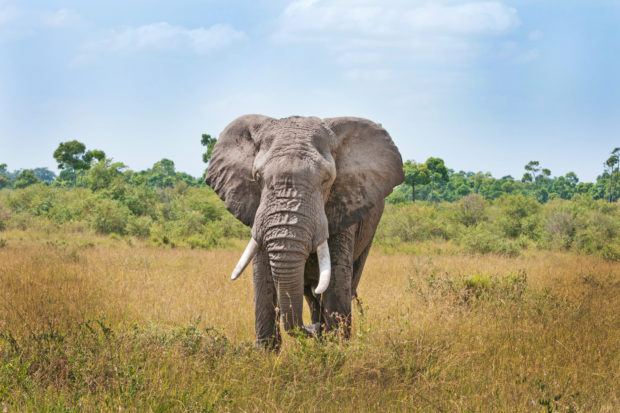
In Zimbabwe, the country from which most elephant trophies imported to the United States originate, wildlife management is so poor that the country has lost six percent of its elephants since 2001. Photo by iStockphoto
Had the Department of the Interior appointed Ted Nugent and Phil and Si from Duck Dynasty to its International Wildlife Conservation Council (IWCC), we might at least have been able to laugh a little. As things stand, however, it’s a crying shame. Formed in November 2017, the council is little more than a trophy hunting trade association masquerading as a public panel.
The IWCC is loaded with officials from Safari Club International, the firearms and ammunition lobby, and professional and celebrity hunters who are bad news for wildlife wherever they go. These council members have one thing on their minds when it comes to threatened animals, and it’s not conservation. It’s killing, and they seek to use the Department of the Interior to destroy any and all barriers to international trophy hunting and the import of trophy heads and parts by U.S. citizens.
By its own admission, the Department of the Interior formed the council to educate the public about the benefits of global trophy hunting; to promote resumption in the legal trade and import of trophy hunted animals; to recommend actions to expedite the processing of import permits for trophy heads and parts; and to advise the agency on the inclusion of foreign listed species under the Endangered Species Act. None of this is needed by our government and there is not one of these people — not one — who deserves a role in guiding the Interior Department’s global wildlife policy. They are for the most part direct beneficiaries of trophy hunting as an industry, with a commercial interest in loosening restrictions on hunting wildlife in Africa and elsewhere. They have personal, financial, or other vested interests, which render them unfit for service.
The IWCC held its first meeting today, several weeks after the U.S. Fish and Wildlife Service, which is part of the Department of the Interior, lifted existing bans on the import of elephant and lion trophies from certain African countries. Given President Trump’s November tweet expressing his distaste for trophy hunting (he called it “a horror show”) and his public remarks doubting the conservation value of trophy hunting, some journalists now worry that he has turned a blind eye. We hope that they’re wrong.
Still others have been giving voice to the trophy hunters’ claim that trophy hunting has conservation and economic value in the nations where it occurs. We know that they are wrong. This is an old argument once again gaining currency in some quarters, but it is a counterfeit one.
In fact, trophy hunting is poorly regulated, fueled by corruption, and biologically unsustainable. It’s also a major factor in driving species to extinction. In Zimbabwe, the country from which most elephant trophies imported to the United States originate, wildlife management is so poor that the country has lost six percent of its elephants since 2001. Scientific studies have demonstrated that elephant hunting is unsustainable, as documented by the decreasing size of tusks on hunted elephants.
Sadly, too, corrupt government officials in Zimbabwe have long been lining their pockets with money generated by trophy hunting. Last month, the entire board of Zimbabwe’s national wildlife authority was fired by the minister of the environment due to corruption. Last year, the director of the wildlife agency was fired for his alleged involvement in the disappearance of rhino horns worth $3 million from a government facility.
Compared to wildlife-related tourism, trophy hunting has low economic value for the nations where it occurs. A 2017 study by Economists at Large found that tourism is worth between 2.8 percent and 5.1 percent of GDP in the eight countries assessed, while the total economic contribution of trophy hunting is at most about 0.03 percent of GDP. Foreign trophy hunters make up less than 0.1 percent of tourists on average and they contribute 0.78 percent or less of the $17 billion in overall tourism spending in the studied countries. Trophy hunting tourism employment is only 0.76 percent or less of average direct tourism employment in study countries.
For these and other reasons, African nations would be wise to focus on wildlife-based tourism rather than trophy hunting, which fails to offer long-term and sustainable income for communities. In an era of dire threat to the world’s wildlife, the Department of the Interior should strengthen its vigilance against wildlife trafficking, poaching, habitat destruction, unsustainable and illegal trophy hunting, and related conservation crimes. Instead, it’s sponsoring a caucus for trophy hunters.
The post Interior Department packs wildlife advisory panel with trophy hunters, firearms lobbyists appeared first on A Humane Nation.
Enviroshop is maintained by dedicated NetSys Interactive Inc. owners & employees who generously contribute their time to maintenance & editing, web design, custom programming, & website hosting for Enviroshop.
